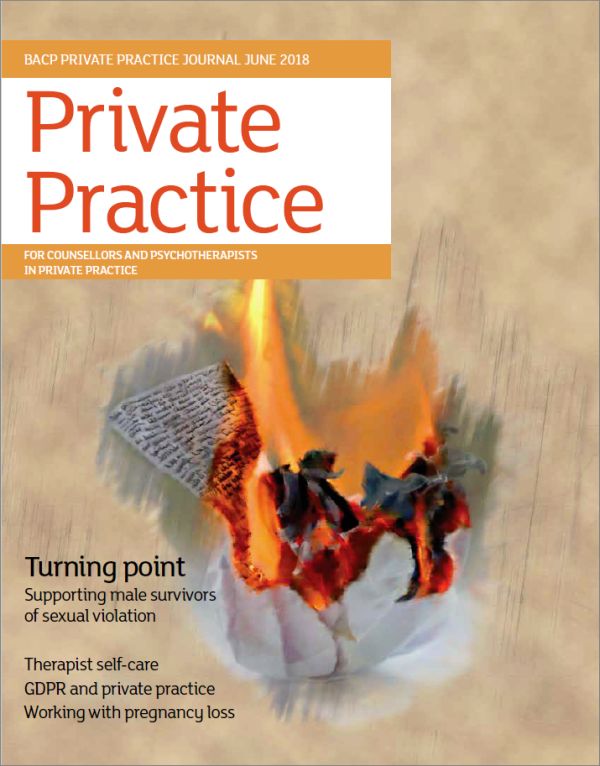In this issue
Features
Turning point (free article)
Sarah Van Gogh on male survivors of sexual violation
GDPR and private practice
Peter Jenkins on the General Data Protection Regulation
A choice like no other
Trudi Dargan on pregnancy loss
Swimming my way through grief
Christine Flanders on coping with crises in our own lives
Practising what we preach
Michelle Seabrook on therapist self-care
Regulars

A pdf of this issue is available for download from the Private Practice archive
Welcome from the editor
‘You must be OK, you’re a therapist.’ How many times have you had this, or something similar, said to you? By friends, acquaintances, family members, people you meet at parties and, let’s not forget, clients, of course. In this issue, Michelle Seabrook reflects on this familiar assumption in her article on self-care, ‘Practising what we preach’.
As therapists, we are no more immune to life’s ups and downs than anyone else. Our relationships have their difficulties, including, sometimes, irreconcilable ones. We weather endings and losses in the same way our clients do; grieve and go through our own dark nights of the soul; endure physical illness and disability; have money worries and professional crises of confidence. Many of us live with anxiety and depression – reactive and endogenous – and grapple with addiction, obsessive compulsions, eating disorders, phobias and all the other coping mechanisms that come with the unavoidable problems of living.
Naturally, our clients need to see us as ‘sorted’, in the early stage of therapy at least, and project onto us the belief that we have the answers. They will experience frustration – whether they are courageous enough to tell us or not – when they realise we don’t, or think that we do and are being deliberately withholding. For good reason, when lost and in states of chaos and suffering themselves, clients need to be able to see us as a safe port in the storm. And at times in our lives when we’re going through our own dark nights, this requires us to be able to bracket and contain our own issues in the service of our clients.
And this comes at a cost, as Michelle explores in her article, perhaps particularly for those of us in private practice, because the financial pressure of working independently can mean that we might continue to work when we’re unwell and, if we work in isolation, we do not have the opportunity to decompress and benefit from the valuable ‘water cooler conversations’ that can be a lifeline to therapists who work as part of a team.
Michelle also observes an anomaly in our profession – that we can often be reluctant to share our personal struggles with other therapists, for fear of judgment, perhaps. By not doing so, she asks, ‘Are we buying into the myth that we’re “OK”?’ She goes on to consider some of the many vital things we can do to manage the impact of our work alongside the stresses and strains of our own lives.
In another feature with a related theme, while going through the terrible experience of her mother’s gradual deterioration with a debilitating illness, alongside managing an often-difficult client load, Christine Flanders explains how she discovered the therapeutic effects of swimming and how this helped her to build resilience to support herself during such a difficult time in her life.
Both Michelle and Christine touch in their articles on the high risk of secondary or vicarious trauma in our work, stressing, as a result, the vital necessity of attending to our self-care. On the theme of trauma, I’m pleased to be publishing in this issue an excerpt from a new book, Helping Male Survivors of Sexual Violation to Recover: An integrative approach – stories from therapy, by our regular columnist, Sarah Van Gogh, about her work over 17 years witnessing the trauma, courage and will to recover of male survivors of sexual violation. Her imagined verbatim account illustrates what it looks, sounds and feels like when a therapist works with men who have experienced a variety of sexually violating experiences.
Topically in this issue, coming so soon after the Republic of Ireland voted overwhelmingly to overturn the abortion ban (by 66.4% to 33.6%), in a feature titled ‘A choice like no other’, Trudi Dargan argues that pregnancy loss is no less painful for those who choose to terminate their pregnancy. ‘The immediate crisis may be over, bringing relief,’ she writes, ‘but many women are left with a deep sadness that resonates with the core of their very being’. Trudi argues that the term ‘pro-life’ ‘can imply that women who opt for abortion are anti-life’. She prefers the term ‘pro-choice’, arguing it ‘befits the highest ethical principle in counselling – that of client autonomy: the individual and sacrosanct human right to choose’.
Finally, on a lighter note, and one that is intended to introduce some humour into these pages and show more of the vulnerabilities, fallibility and humanness that comes with being a therapist, we are introducing a regular new column, ‘Imperfect Therapist’. I hope it makes you smile and that our imperfect therapist Lizzie’s musings might resonate with you. Let me know either way. I’m always pleased to hear from you.
John Daniel, Editor
privatepractice.editorial@bacp.co.uk
